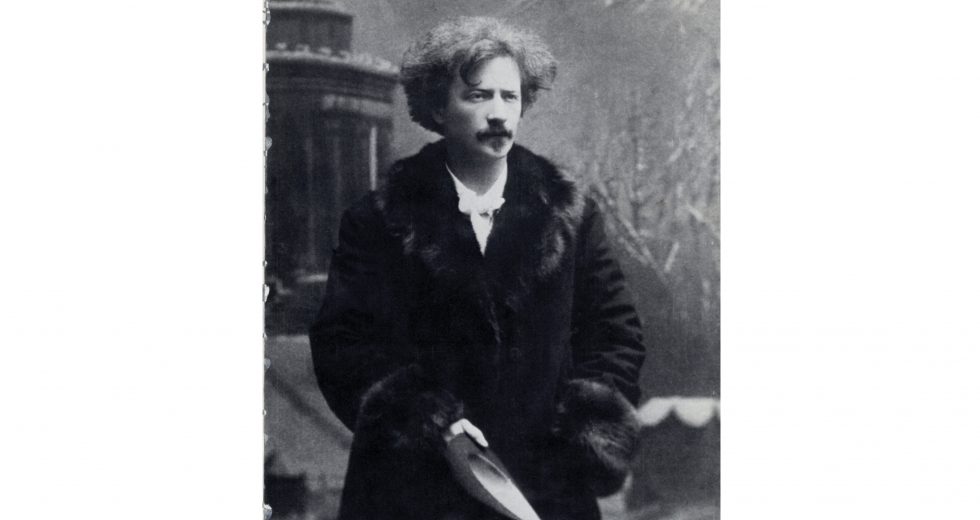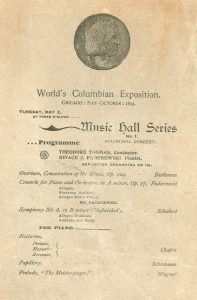
In American Orchestras in the Nineteenth Century, Brenda Nelson-Strauss wrote that 1892 “found the city in a frenzy of preparations for the World’s Columbian Exposition, planned as a celebration of the 400th anniversary of the discovery of America by Columbus and constructed on a grandiose scale that would surpass the [1876] Philadelphia Centennial Exhibition. Thomas was appointed director of the Bureau of Music, and he issued a proclamation in the spring of 1892 setting forth many lofty goals, among them ‘the hearty support of American musicians, amateurs, and societies, for participation on great festival occasions of popular music, and for the interpretation of the most advanced composition, American and foreign.’ ”
For the exposition’s inaugural concert on May 2, 1893, Ignace Paderewski performed his Piano Concerto in A minor, and Theodore Thomas conducted the Exposition Orchestra (the Chicago Orchestra expanded to 114 players).*
“Those who sat beneath the potent spell [Paderewski’s] mighty genius weaves could but acknowledge his unrivaled greatness and congratulate the exposition upon having secured him for the assisting artist at the inaugural concert,” reported the Chicago Tribune. “All of [his selections] he had played here before, and as the surpassing beauty and matchless artistic greatness of his performances were pointed out at that time, attempt to comment upon the work of yesterday could but result in feeble reiteration of praise that to be adequate must seem rhapsody.”
Paderewski had first appeared during the Orchestra’s first season on January 1 and 2, 1892, as soloist in Rubinstein’s Fourth Concerto and Liszt’s Fantasia on Hungarian Folk Melodies. In Paderewski Adam Zamoyski noted, “In Chicago, too, he found a magnificent orchestra and conductor, Theodore Thomas, ‘a real musician, a musician by the Grace of God.’ At the Chicago Auditorium he played to his largest audience yet—4,000 people. Prominent amongst these, he noticed with emotion, were hundreds of local Polish émigrés who had flocked to the concert at the sound of his name.”
A regular visitor to Chicago both as concerto soloist and recitalist for more than forty years, Paderewski last appeared with the Orchestra on March 31 and April 1, 1932, in Schumann’s Piano Concerto with Frederick Stock conducting.
*It had been decided that only pianos made by exhibiting companies could be used at the fair. Steinway, which was not exhibiting, was preferred by Paderewski, and one of its pianos was sneaked into the Music Hall the night before the May 2 concert, unbeknownst to Thomas. However, numerous piano manufacturers accused him of conspiring with Paderewski, and there was significant public debate. After having conducted nearly seventy concerts in little more than three months, “by mid-August of 1893, distraught over poor attendance and mired in controversy, Thomas resigned as musical director” of the fair, according to Nelson-Strauss.
Image above: Ignace Paderewski in the 1890s
This article also appears here.
